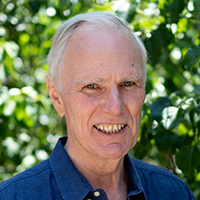Philip Alston AO
After weeks of scheduling clashes, Violet and I logged onto Zoom at 10:25am, five minutes before the time we had asked to speak with Philip Alston. Despite the time difference, Philip was right on time, sitting in a darkened room in New York, America. Immediately, we sensed that we had his full attention; Philip’s demeanour is relaxed and open to how we guide the conversation.
Graduating from Melbourne Law School with a BComm/ LLB in 1972, Philip Alston did not have the same variety of courses on human rights and public law as are on offer in 2022. But Philip was always interested in the public side of law rather than the private rise and sought to engage in his interests in environmental law through an honours year. This interest was continued through a Masters degree at the Law School, which Philip pursued instead of completing his articles and practicing law like many of his colleagues. From here, the recent Order of Australia awardee continued on a pathway less travelled to become one of the world’s leading human rights practitioners and scholars.
When asked how he arrived at his current position within the human rights field as a Professor of Law at New York University and the co-chair for the Centre for Human Rights and Global Justice, Philip is humble. He recounts his first engagement with the United Nations, aware of how competitive the space has now become. It began with a draft of an article which he spent six months researching and writing, and then sent, unsolicited, to the Head of Human Rights at the United Nation. This paper transformed his career path when it led to an offer to take on a role as a consultant with the UN human rights office.
What began as an initial three month contract, became a five year position based in Geneva working on human rights issues. Alongside this work, Philip also managed to complete on his PhD dissertation part time. This balancing of practice and research would be continued throughout his career, with one foot always placed firmly in the human rights field, and another within the academic circles of the most prestigious universities in the world including ANU, Harvard and NYU. Philip impressed on us the importance of making a scholarly contribution to human rights literature, both for progress within the field and for one’s own skill development. For him academic work allows us to “demonstrate knowledge, analytical capacities and research and writing skills.” But “applied legal scholarship can go a long way” to creating meaningful change or impact in the ways in which human rights are adhered to in different contexts.
In the world of clerkships, internships, planned career trajectories and long-term commitments to certain organisations, it is refreshing to hear from a prominent legal figure who had a varied pathway which could hardly be planned. There is a comfort in knowing that following your interests and passion can lead to rewarding roles — positions that at the time may have not been competitive, but have since become coveted and internationally recognised as invaluable to the progress of human rights.
Having worked as an advisor for the European Union and UNICEF, as a Special Rapporteur on extreme poverty and human rights for the United Nations, and many other advisory positions, Philip commands a unique position to comment on the state of human rights. He warns that the human rights movement has “become rather narrow”, not treating economic and social rights as important issues to be tackled. He uses taxation as an example of a human rights issue which is not generally afford this status, explaining that it is as vital to the progress of women’s rights as is abortion rights or the right to education.
Tracing this back to the way we define ‘human rights’, Philip makes the case that human rights are a lot broader than most people would think. Instead of narrowing our definition of the field to equally important, but often sensationalised issues, we should look to the problems that people face every day all over the world. Human rights are more relevant to the “normal person” than we think — we need to look to the single mother with no mental health support, to the migrant on a temporary visa with a lack of healthcare access, to the child without proper nutritional support. When human rights are connected to lived experiences, they become less abstract, and that’s why Philip sees the value in communities using the language of rights to mobilise and demand better conditions from governments.
Philip speaks to the growing challenge of privatisation, which “makes it ever more difficult for the government to regulate in any meaningful way”. He points to the danger of putting “the most crucial decisions in the hands of private business”. However, these are the issues which will face the most resistance to change. Philip warns that working on issues like privatisation or tax policy will attract discouragement, and a rhetoric that those problems are “not human rights issues”. Those in power see research and progress on structural challenges as threats to the status quo. As Philip put it, human rights “threaten the elite”.
Philip’s perspective sheds light on the structure of the legal field, from the under-resourcing of community legal centres to the focus of legal education largely being corporate. His work and words inspire us to push against the main narratives around what a legal career can look like, what ‘human rights’ does or does not entail and how we can impact change in our own way, doing what we are most passionate about.
Prepared by: Zenia Vasiawalla and Violet Danham-Blau
JD Students MLS
October 2022
